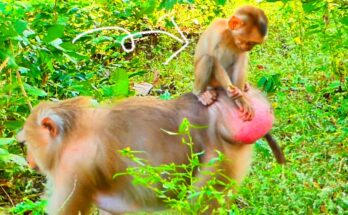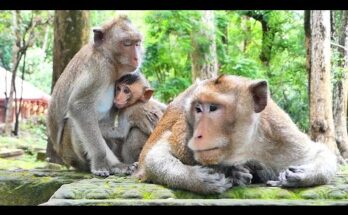It was an ordinary afternoon when I first noticed something was off with Jobi, the little monkey I had been caring for at the wildlife sanctuary. Jobi was usually an energetic, mischievous bundle of joy, always darting around the enclosures, playing with the other animals, and eagerly accepting food whenever it was offered. But today, he refused the banana I extended to him. He turned away from it, eyes wide and slightly glazed, and that was the first moment I felt that sinking feeling in my stomach.
Monkeys, like Jobi, are very social animals and are known for their playful nature. They enjoy interaction and food as much as they do playing. So when Jobi refused food, especially something as delicious as a ripe banana, it was uncharacteristic to say the least. I tried offering him a few more treats—a handful of peanuts, a piece of mango, and even some of his favorite honey drizzled on a cracker—but he ignored them all. His lack of interest was alarming.
I watched him closely, trying to figure out what was happening. His body language was all wrong: his normally lively posture was slumped, and he seemed unusually quiet, which was out of character for him. I called the vet immediately, explaining the situation, but the waiting time felt like an eternity. All I could do was stand there, feeling a wave of anxiety wash over me. Was Jobi sick? Had he eaten something harmful? Was he stressed or depressed?
During those tense moments, I couldn’t help but think about the bond we’d built over the past few months. Jobi wasn’t just a monkey I took care of—he had become a friend. His playful antics, his little hand gestures, and his joyful shrieks had all become a part of my daily life. Seeing him in this state made me feel helpless, and I was terrified that I might lose him.
By the time the vet arrived, Jobi had moved to a corner of the enclosure, sitting by himself and staring at the ground. The vet did a thorough examination and found no signs of any major illness or injury. After a few more tests and a careful review of his diet, the diagnosis came in: Jobi was likely stressed due to the change in the weather. It was a hot day, and sometimes temperature changes can affect a monkey’s appetite and mood.
Relieved yet still worried, I made sure Jobi had plenty of water and some fresh fruit, which he eventually ate slowly. It was a relief to see him nibbling on the apple slices again, but the experience left me shaken. I learned that animals, especially those in captivity, can sometimes be affected by things we don’t immediately notice, like the weather or subtle changes in their environment. That day reminded me just how sensitive and precious these creatures are.


